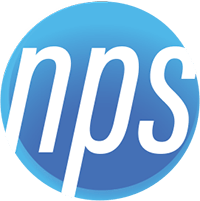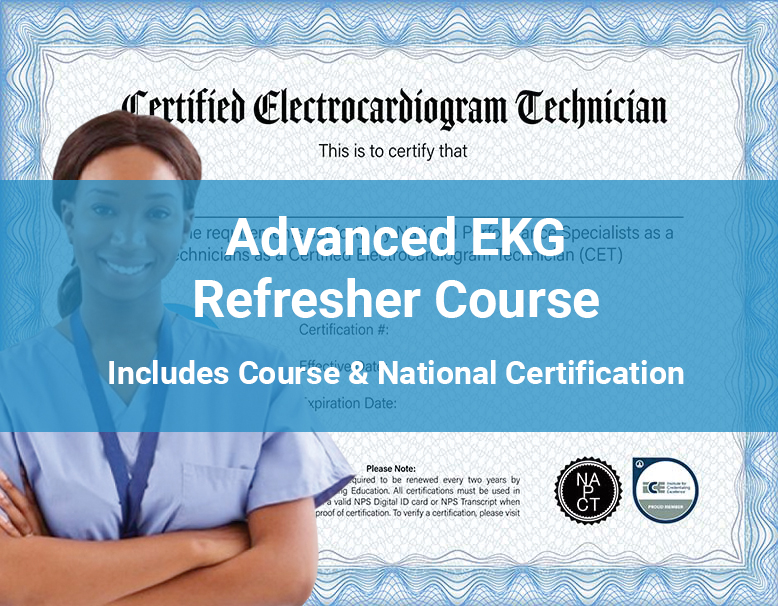Description
The Advanced EKG Refresher Course is completed online at your own pace. This refresher course will include the cost of your National CET Certification through the American Society of EKG Technicians.
This course will explain cardiac anatomy, physiology, and electrical conduction to understand the electrocardiogram and rhythm patterns. Students will understand how to recognize and interpret normal cardiac patterns and arrhythmias based on waveforms of an EKG, including the causes, clinical manifestations, and treatment options.
Course Details
Foundation of the EKG
- Basic anatomy and physiology of the heart
- Cardiac electrophysiology
- Automaticity, contractility, conductivity
- The Action Potential: Depolarization and Repolarization
Components of the EKG
- EKG basics – waves, intervals, segments
- Reading the EKG
- Measurements
- Calculation of heart rate
- Leads
- Performing an EKG
- Cardiac monitors
- Normal EKG
- Interpret EKG
- Limitations and Uses of the EKG
Recognition of Sinus Rhythms
- Normal Sinus Rhythm
- Normal Sinus P Wave
- Normal Sinus QRS Complex in Chest Leads
- Normal Sinus QRS Complex in Limb Leads
- Normal Sinus ST Segment
- Normal Sinus T Wave
Sinus Node Arrhythmias
- Normal Sinus Rhythm
- Sinus Bradycardia
- Sinus Tachycardia
- Sinus Arrhythmia
- Escape Patterns
- Sick Sinus Syndrome
Cardiac and Pulmonary Syndromes
- Cardiac Enlargement
- Acute Pericarditis
- Pericardial Effusion
- Chronic Constrictive Pericarditis
- Myocarditis
- Congestive Heart Failure
- Pulmonary Embolism
- Chronic Obstructive Pulmonary Disease
Bundle Branch Blocks
- Right Bundle Branch Block (RBBB)
- Left Bundle Branch Block (LBBB)
- Fascicular Blocks
Myocardial Injury, Ischemia, and Infarction
- Myocardial Injury
- Myocardial Ischemia
- Myocardial Blood Supply
- Acute Coronary Syndrome (ACS)
- STEMI and Acute Myocardial Infarction
- Q Waves of Infarction
- Localization of Infarction
- Anterior Wall Q Waves
- Inferior Wall Infarctions
- Posterior Infarctions
- Right Ventricular Infarctions
- Q Waves: Normal or Abnormal
- Ventricular Aneurysm
- Silent Myocardial Infarctions
- Subendocardial Ischemia
- Angina pectoris (Stable Angina)
- Stress Testing and Coronary Artery Disease
- Silent Myocardial Ischemia
- NSTEMI “Subendocardial Infarction”
- Unstable Angina
- Noninfarction Ischemia
- Prinzmetal’s (Variant) Angina
- Early Repolarization
Atrial Arrhythmias
- Wolff-Parkinson-White (WPW) Syndrome
- WPW Treatment
- Premature Atrial Contraction (PAC)
- Paroxysmal Atrial Tachycardia (PAT)
- AV Nodal Reentrant Tachycardia (AVNRT)
- AV Reentrant Tachycardia (AVRT)
- Management of Acute PAT
- Long-Term Management of PAT
- Atrial Flutter
- Atrial Fibrillation
- Differentiation of Atrial Flutter and Atrial Fibrillation
- Clinical Implications for Atrial Flutter and Atrial Fibrillation
- Treatment of Atrial Flutter and Atrial Fibrillation
Ventricular Arrhythmias
- Premature Ventricular Contraction (PVC)
- Ventricular Tachycardia (VT)
- Torsade des Pointes (TdP)
- Accelerated Idioventricular Rhythm (AIVR)
- Ventricular Fibrillation (VF)
- Cardiac Arrest
- Clinical Causes of Cardiac Arrest
- Sudden Cardiac Death
AV Conduction Abnormalities
- Degrees of Heart Block
- First Degree AV Block: PR Interval Prolongation
- Second Degree AV Block Syndromes
- Third Degree (Complete) AV Block
- Location of the Block
- Onset and Progression of Block
- 2:1 AV Block
- Atrial Fibrillation or Flutter with AV Heart Block
- Symptoms of Heart Block
- Treatment
- AV Heart Block in Acute MI
- AV Dissociation Syndromes
Medication Effects, Electrolyte Imbalances, and Metabolic Factors
- Medications Used to Treat Arrhythmias
- Psychotropic Medications
- Digitalis Toxicity
- Electrolyte Disturbances
- Additional Metabolic Factors
- ST-T Segment Repolarization Changes
Pacemakers and Implantable Cardioverter Defibrillators (ICD)
- Pacemakers
- Implantable Cardioverter Defibrillators (ICD)
- Pacemaker and ICD Malfunction
- Indications for a Pacemaker or ICD
An Approach to EKG Interpretation
- Thirteen Specific EKG Features to Analyze
- The EKG Report
- Examples of EKG Interpretation Documentation
Cardiac Stress Tests
- What Causes Chest Pain?
- Exercise Stress Test
- Risks
- Before the Test
- Placing the ECG leads
- Beginning the Stress Test
- After the Stress Test
Nuclear & Echo Stress Tests
- Before the Test
- Placing the ECG leads
- Limb Lead Placement for ECG
- During the Test
- After the Test
- Stress Echocardiogram
- Before the Test
- During the Test
- After the Test
- Limb Lead Placement for ECG
Holter Monitors
- History
- Modern Holter Monitors
- Heart Conditions Detected via Holter Monitor
- Atrial Fibrillation (A-Fib):
- Bradycardia:
- Tachycardia:
- Supraventricular Tachycardia (SVT):
- Premature Ventricular Contractions (PVCs):
- Premature Atrial Contractions (PACs):
- Non-sustained Ventricular Tachycardia (NSVT):
- Placing the Holter Monitor
Program Page: https://npscerts.com/ekg-refresher-course/








